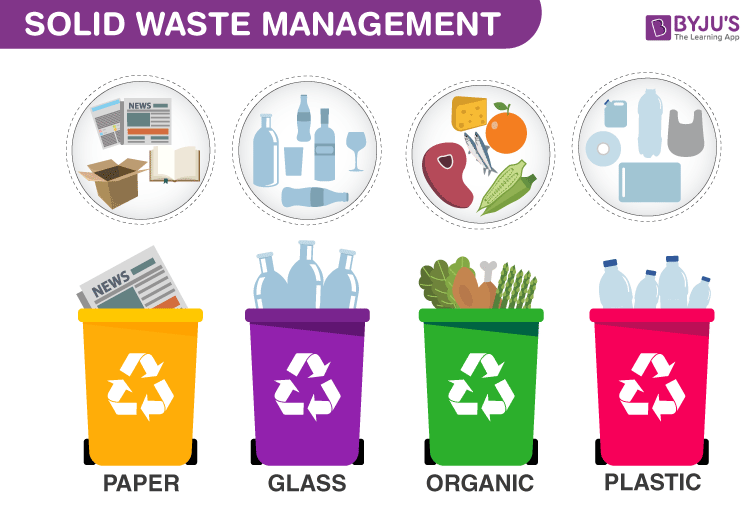The term solid waste management mainly refers to the complete process of collecting, treating and disposing of solid wastes.
In the waste management process, the wastes are collected from different sources and are disposed of. This process includes collection, transportation, treatment, analysis and disposal of waste. It needs to be monitored so that strict regulations and guidelines are followed.

Sources of Solid WastesSolid Waste Management DiagramDisposal of WasteEffects of Poor Solid Waste ManagementFrequently Asked Questions

Sources of Solid Wastes
- Solid domestic garbage.
- Solid waste material from various industries.
- Solid agricultural waste.
- Plastics, glass, metals, e-waste, etc.
- Medical waste.
- Construction waste, sewage sludge
Solid Waste Management Diagram
Disposal of Waste
The process of waste handling and disposal varies in different countries. In India, the processes differ according to the source of solid waste. They can be classified as:
⦁ Municipal Solid Waste.
⦁ Hazardous Solid Waste.
Municipal solid waste can further be divided into biodegradable, recyclable and hazardous domestic wastes. The biodegradable waste includes rotten food, vegetable peel and mostly wet kitchen waste. Recyclable waste includes plastic and hazardous wastes include, bulb, batteries, etc.
The industry generated waste from chemical factories, medical waste from hospitals are considered as Hazardous Solid Waste and they need special settings to dispose of them.
In any region, solid waste management is very important for the safe disposal of wastes and to reduce environmental pollution and avoid any health hazards that it may cause.
Landfills are the most common method of disposing of solid wastes. Modern-day landfills are designed by taking care of various environmental factors and types of wastes, so as to minimise pollution and health risks.
Also Refer: Waste Disposal
Effects of Poor Solid Waste Management
Due to improper disposal of solid waste particularly by waste management organizations, the collected wastes gets heap up and become a problem for both the environment and also for the public.
By dumping of huge garbage, drives biodegradable materials to decay and decompose under abnormal, uncontrolled and unhygienic conditions. After a few days of decomposition, it becomes a breeding ground for different types of disease-causing insects as well as infectious organisms. A foul smell is produced and it also spoils the aesthetic value of the area.
The solid wastes collected from different industries include toxic metals, chemicals, and other hazardous wastes. When these wastes are released into the environment, they can produce biological and physicochemical problems to the environment, the chemicals may drain into the soil and pollute the groundwater and also alter the productivity of the soils in that particular area.
In rare cases, the hazardous wastes may get mixed up with the ordinary garbage and other combustible wastes causing the disposal process even harder and risky.
By burning the paper and other scraps along with the hazardous wastes, dioxins and poisonous gasses are produced and released into the air which results in causing various diseases including chronic disease, skin infections, cancer, etc.
Also Refer: Causes of Waste Management – Explore Why Waste Management Is Important
To learn more about solid waste management with diagram Visit BYJU’S.

Frequently Asked Questions
What is solid waste management?
Solid waste management denotes the process of collecting, treating and disposing of solid wastes. Solid waste can be domestic, agricultural or even industrial wastes.
What are the different types of waste?
Waste can be broadly divided into liquid waste, industrial waste, solid garbage, radioactive waste and recyclable waste. This includes garbage from households, industries, schools, offices, marketplaces, restaurants and other places.
What are industrial wastes?
Industrial wastes are typically generated from chemical plants, cement factories, power plants, textile industries, food processing industries, and petroleum industries. Each of these industries produces different types of waste products.



thanks
thanks,,,,,,,,
Thanks